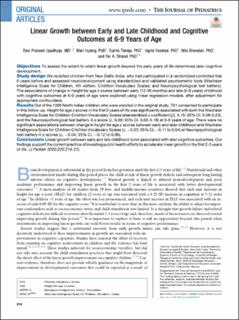| dc.description.abstract | Objectives: To assess the extent to which linear growth beyond the early years of life determines later cognitive development. Study design: We revisited children from New Delhi, India, who had participated in a randomized controlled trial 6 years before and assessed neurodevelopment using standardized and validated psychometric tools (Wechsler Intelligence Scale for Children, 4th edition; Crichton Vocabulary Scales; and Neuropsychological test battery). The associations of change in height for age z scores between early (12-36 months) and late (6-9 years) childhood with cognitive outcomes at 6-9 years of age were explored using linear regression models, after adjustment for appropriate confounders. Results: Out of the 1000 North Indian children who were enrolled in the original study, 791 consented to participate in this follow-up. Height for age z scores in the first 2 years of life was significantly associated with both the Wechsler Intelligence Scale for Children-Crichton Vocabulary Scales (standardized β coefficient [β], 0.15; 95% CI, 0.08-0.23), and the Neuropsychological test battery-II z-score (β, 0.09; 95% CI, 0.03-0.18) at 6-9 years of age. There were no significant associations between change in height for age z scores between early and later childhood and Wechsler Intelligence Scale for Children-Crichton Vocabulary Scales (β, -0.03; 95% CI, -0.11 to 0.04) or Neuropsychological test battery-II z-scores (β, -0.04; 95% CI, -0.12 to 0.06). Conclusions: Linear growth between early and late childhood is not associated with later cognitive outcomes. Our findings support the current practice of investing public health efforts to accelerate linear growth in the first 2-3 years of life. Keywords: India; cognition; early childhood; linear growth; middle childhood. | |

